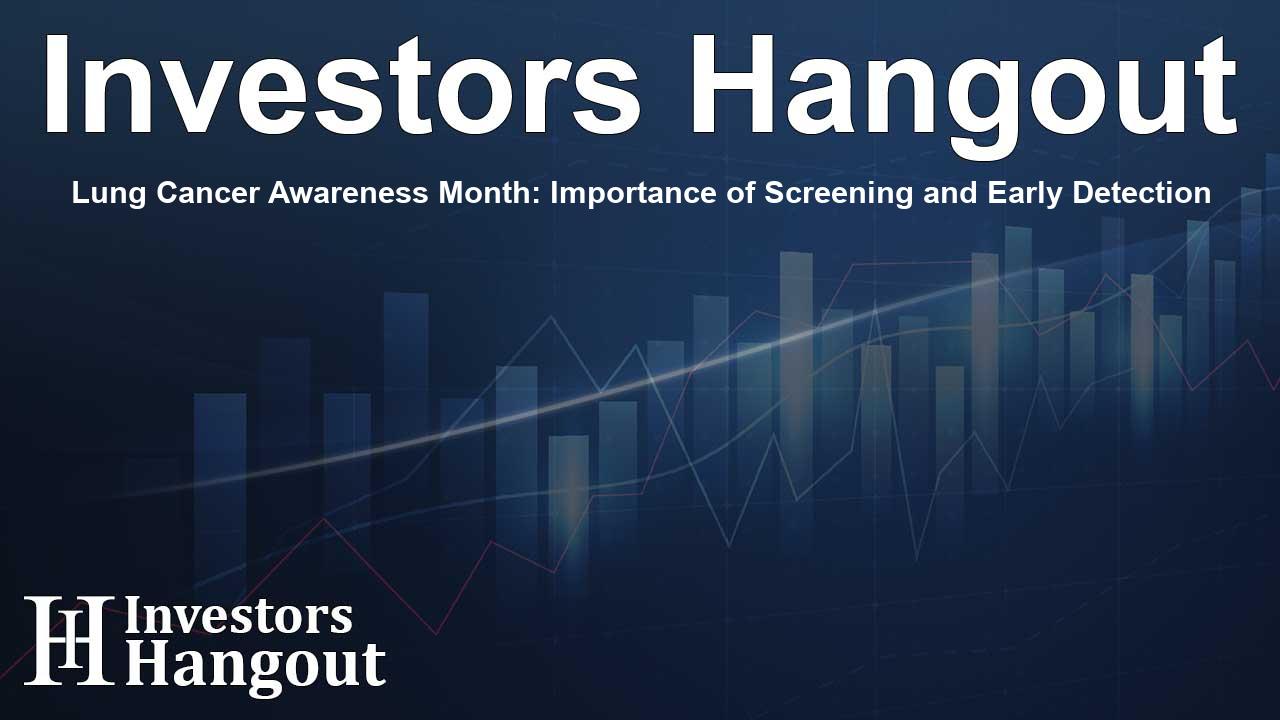Lung Cancer Awareness Month: Importance of Screening and Early Detection

Lung Cancer Awareness Month and Its Significance
Each year, November is recognized as Lung Cancer Awareness Month, a time dedicated to increasing understanding about one of the most serious health issues. This initiative encourages open discussions between patients and healthcare providers about the importance of lung cancer screening. Early detection can make a profound difference in treatment options and outcomes.
The Reality of Lung Cancer
Lung cancer is a pressing health concern, ranking as the second most common cancer among both men and women, following only skin cancer. More alarmingly, it is the leading cause of cancer-related deaths. Statistics indicate that thousands will be diagnosed each year with this aggressive disease. Understanding the implications of delayed diagnosis is crucial; symptoms often do not surface until the cancer has reached an advanced stage. Hence, screening plays a critical role in enabling timely intervention.
The Importance of Screening
Regular lung cancer screenings can be life-saving, particularly for those at higher risk. The American Cancer Society recommends annual low-dose computed tomography (CT) scans for individuals aged 50 to 80 who have a significant smoking history. A pack-year, which is defined as smoking one pack per day for one year, forms the basis for risk assessment. This guideline is designed to catch lung cancer in its early, more treatable stages.
Current Screening Rates and Challenges
Despite the proven advantages of lung cancer screening, participation rates are troublingly low. Research indicates that only a small fraction of eligible individuals undergo these essential screenings. For example, in certain regions, only 7 out of 100 candidates participate in regular screenings. This stands in stark contrast to other cancer detection methods, such as mammography and colorectal cancer screenings, where much higher rates of participation are noted.
Addressing Screening Barriers
Access to lung cancer screenings remains a significant hurdle, especially for those in rural communities who often find themselves living far from medical facilities that offer these services. Many face challenges that include financial barriers, lack of insurance, and low health literacy. Understanding and overcoming these challenges requires collaboration between community organizations, healthcare providers, and advocacy groups to promote screening and improve health equity.
Voices from Experts
Healthcare professionals emphasize the necessity of encouraging eligible patients to consider lung cancer screening. Experts from various cancer organizations highlight that timely detection can substantially enhance survival probabilities. It is estimated that only a small percentage of lung cancer patients receive their diagnosis at an earlier stage, underscoring the need for continual efforts to raise awareness about screening benefits.
Collaborative Efforts for Improvement
In response to these challenges, organizations have formed initiatives aimed at enhancing screening rates. A notable effort involves a collaborative series led by cancer prevention advocates, focusing on developing targeted plans to increase rates of lung screening. Partnerships among health systems, community health organizations, and cancer care advocates are essential to boost awareness and simplify access to screenings.
Find Your Screening Location
As lung cancer remains a critical public health challenge, individuals are encouraged to seek information about their local screening options. Many resources can assist in locating nearby facilities that offer screening tests, providing an important avenue for early detection.
Frequently Asked Questions
What is Lung Cancer Awareness Month?
Lung Cancer Awareness Month is observed in November to promote awareness and education regarding lung cancer and its screening.
Why is screening for lung cancer important?
Screening helps detect lung cancer at earlier, more treatable stages, significantly improving outcomes for patients.
Who should get screened for lung cancer?
Individuals aged 50 to 80 with a heavy smoking history are recommended to undergo annual screening.
What type of screening is typically used for lung cancer?
The preferred screening method is a low-dose computed tomography (CT) scan, known for its effectiveness in early detection.
How can I find a screening center?
To find a local screening center, individuals can consult healthcare providers or visit reputable cancer organization websites for referrals.
About Investors Hangout
Investors Hangout is a leading online stock forum for financial discussion and learning, offering a wide range of free tools and resources. It draws in traders of all levels, who exchange market knowledge, investigate trading tactics, and keep an eye on industry developments in real time. Featuring financial articles, stock message boards, quotes, charts, company profiles, and live news updates. Through cooperative learning and a wealth of informational resources, it helps users from novices creating their first portfolios to experts honing their techniques. Join Investors Hangout today: https://investorshangout.com/
Disclaimer: The content of this article is solely for general informational purposes only; it does not represent legal, financial, or investment advice. Investors Hangout does not offer financial advice; the author is not a licensed financial advisor. Consult a qualified advisor before making any financial or investment decisions based on this article. The author's interpretation of publicly available data shapes the opinions presented here; as a result, they should not be taken as advice to purchase, sell, or hold any securities mentioned or any other investments. The author does not guarantee the accuracy, completeness, or timeliness of any material, providing it "as is." Information and market conditions may change; past performance is not indicative of future outcomes. If any of the material offered here is inaccurate, please contact us for corrections.









